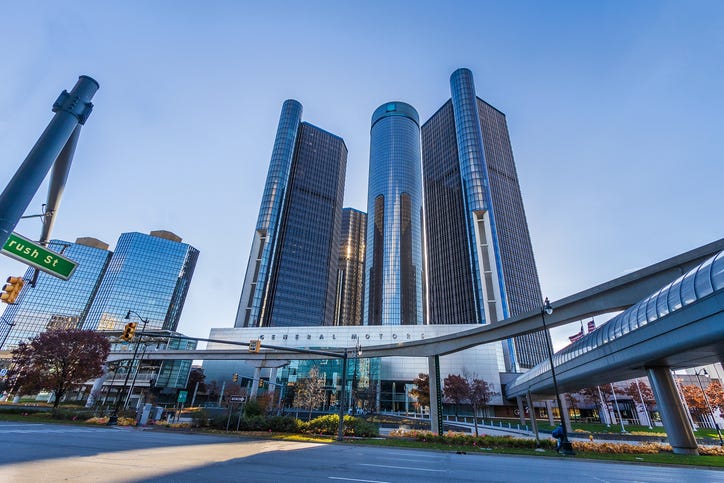
DETROIT (WWJ) -- The Detroit riverfront could see a more drastic change than initially proposed, under a new plan (or threat?) floated by developers.
General Motors told the Detroit Free Press that if it can’t secure the $250 million in public funding GM and and billionaire Dan Gilbert claim they need for the Renaissance Center/riverfront redevelopment project, the automaker is prepared to demolish all five towers it owns and pay the full cost.
Would it be possible to just tear the whole thing down?
Speaking live on WWJ Newsradio 950, Wayne State University Law Professor John Mogk said, while he doesn't think it will come to that, it's certainly possible from a legal perspective.
"It's a tough call," Mogk told WWJ's Greg Bowman, in an interview Monday morning. "There shouldn't be any legal issues that are connected with GM that owns the RenCen tearing it down, but the RenCen has been a symbol of Detroit since it was built.
"And, unfortunately, when it was built, there was no market for the office space. And so it went about the business of draining many of the offices that are west of Woodward and causing a collapse of the office area there. But... if one were to start over again and try to develop the best possible scheme for the waterfront, the RenCen would not be reconstructed as it is."
Mogk said Gilbert's new plan for the area, which would open the area up to the community — involving recreation and restaurants, with some offices and housing — makes a lot more sense for the city than what's presently there.
"And the proposal that's been made looks attractive.. if it can be carried out. That's a really a tough question," Mogk said. "And the $250 million public subsidy that's being requested basically would mean a major additional investment in Detroit.
"I think the waterfront is going to be successful either way," he said. "Whether it's the Ren Cen is torn down and that very valuable land is used for other public and private purposes, or whether the RenCen project moves forward."
When the RenCen opened in 1976, it was as meant to anchor a wider redevelopment of the then-struggling city of Detroit. Conceived as a sort of city within a city, people described the complex as a fortress the way it was built with a berm around it — calming nervous investors who had safety concerns at the time.
As far as using public money to fund a project like this, Mogk said there's no legal reason why not.
"It's quite permissible from a legal perspective to use public funding to enter into what might be viewed as a public private partnership to stimulate economic development," he said.
"I think the fact that the District Detroit, the new Hudson development by the Gilbert organization, the renovation of the Michigan Central Depot for by Ford Motor Company, all re required some kind of a major hundreds of million dollars of subsidy indicates that these projects don't stand on their own; that the private money alone cannot get a reasonable return on investment to carry them out."
Mogk said, in cases like this, the reason for the public investment is to prime the pump, so to speak, to basically move the downtown area and the waterfront in Detroit to a point where no subsidies are no longer needed.
"But it's obvious we haven't reached that point," he said. "And then the question becomes well, will the ripple effect from the public investment result in other private investment for which no subsidies needed?
And that has yet really to prove itself but the hope is in the next decade that these major developments will have this economic outreach in areas further out from, from where they're located.
"We'll see private development and investment without without needing any more public funding."
As for what's ahead, Mogk said he expects the concerned parties — including lawmakers who have spoken out again the plan — to reach some sort of middle ground, which probably will result in something along the lines of the initial proposal.
Gilbert's company Bedrock said the plan to tear down two towers and renovate three "preserves the essence of Detroit’s skyline," while it also “right sizes” the RenCen’s footprint, and connects the site to the heart of downtown.
According to a news release, the surrounding entertainment district, under this plan, "would become a vibrant waterfront destination, drawing international visitors and featuring restaurants, hospitality, residential and market space—complementing Detroit’s award-winning Riverwalk, which draws more than 3.5 million annual visitors to the city." (Read more).
Gilbert and GM said the complete project, as outlives, is expected to cost around $1.6 billion.
